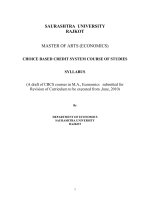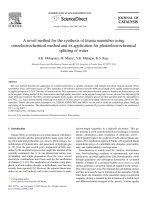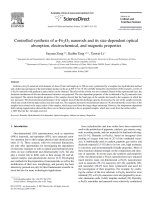Regioselective synthesis of bicyclic 1,3,5-triazepine system starting from tetrachloro-2-aza-1,3-butadienes
Bạn đang xem bản rút gọn của tài liệu. Xem và tải ngay bản đầy đủ của tài liệu tại đây (343.4 KB, 6 trang )
Current Chemistry Letters 6 (2017) 49–54
Contents lists available at GrowingScience
Current Chemistry Letters
homepage: www.GrowingScience.com
Regioselective synthesis of bicyclic 1,3,5-triazepine system starting from
tetrachloro-2-aza-1,3-butadienes
Bohdan A. Demydchuka*, Eduard B. Rusanovb, Julia A. Rusanovac and Volodymyr S. Brovaretsa
a,
Institute of Bioorganic Chemistry and Petrochemistry, National Academy of Sciences of Ukraine, Murmanska str. 1, 02094 Kyiv, Ukraine
Institute of Organic Chemistry, National Academy of Sciences of Ukraine, Murmanska str. 5, 02094 Kyiv, Ukraine
Department of Chemistry, Taras Shevchenko National University, Volodymyrska Str. 64/13, Kyiv, 01601, Ukraine
b
c
CHRONICLE
Article history:
Received August 21, 2016
Received in revised form
October 24, 2016
Accepted 15 February 2017
Available online
15 February 2017
Keywords:
Tetrachloro-2-aza-1,3-butadienes
N-phenyl-1,2cyclopentanediamine
1,3,5-triazepine, regioselective
annulation
ABSTRACT
Readily available tetrachloro-2-aza-1,3-butadienes enter into directed cyclocondensation
reaction with N-phenyl-1,2-cyclopentanediamine which leads to regioselective cyclopentane
annulation by the 1,3,5-triazepine. The formation of the 1,3,5-triazepine derivatives was
confirmed proved by 1H- and 13C-NMR spectral study, elemental analysis and, in one case,
single-crystal x-ray crystallographic study.
© 2017 Growing Science Ltd. All rights reserved.
1. Introduction
1,3,5-Triazepines and their derivatives are found to be associated with various biological activities:
antibacterial, antiviral, psychotropic activity,1,2 CCK2 receptor antagonists,3 phospholipase A2
inhibitors,4 HIV capsid assembly inhibitors.5 However, information about hydrogenated 1,3,5triazepine derivatives is very limited. Thus, due to the difficulty of such structures obtaining, 6,7dihydro-1Н-1,3,5-triazepines are presented by only two compounds.6-8
The efficient and selective method for synthesis of 7-membered heterocycles are [4+3]cycloaddition processes.9,10 Unfortunately, this approach is not adequate for preparation of 1,3,5triazepines. Previously we proposed to use readily available 1-aryl-1,3,4,4-tetrachloro-2-aza-1,3butadienes 1 for synthesis [1,3,5]triazepino[1,7-a]benzimidazole derivatives.11 In the present work we
use 1 for preparation of novel 1-substituted 6,7-dihydro-1Н-1,3,5-triazepines which are annulated with
cyclopentane fragment by f-edge.
* Corresponding author. Fax: +380(44) 5732561
E-mail address: (B. A. Demydchuk)
© 2017 Growing Science Ltd. All rights reserved.
doi: 10.5267/j.ccl.2017.2.001
50
2. Results and discussion
Synthesis of cyclopenta[f][1,3,5]triazepines 5 was performed via interaction of reagents 1 with Nphenyl-1,2-cyclopentadiamine 2. This reaction proceeds in THF at room temperature quite
regioselectively and involves electrophilic centre С1 and primary aminogroup giving intermediates 3
(see Scheme 1).
R
R
R
Cl
N
H2N
+
Et3N
HN
Cl
Ph
Cl
N
N
H
N
Cl
Cl
Cl
2
Ph
HN
Cl
Ph
Cl
Cl
1a-c
HN
N
3
H Cl
4
Et3N
R
R
R
Ph
Ph
N
N
Cl
Cl
Cl
6
NH2
N
N
Cl
H
H
N
N
N
Cl
7
Cl
H
N
Cl
Ph
H
5a-c
Scheme 1. Synthesis of cyclopenta[f][1,3,5]triazepine from tetrachloro-2-aza-1,3-butadienes.
The last ones are ready to undergo a [1,5]-sigmatropic shift 3 → 4 to form imidoyl chloride
fragments which leads to further intramolecular heterocyclization with formation of a 1,3,5-triazepine
cycle.
In
such
way
4-aryl-2-(dichloromethyl)-1-phenyl-1H,5aH,6H,7H,8H,8aHcyclopenta[f][1,3,5]triazepines were prepared and isolated with 92-96% yields. The probability of
alternatively interaction of imidoyl chlorides 1 with diamine 2 resulting in formation of 6 and 7 is very
small as far nucleophilicity of NH2-group is much higher then nucleophilicity of NH-phenyl-group.
Such selectivity of tetrachloro-2-aza-1,3-butadienes 1 to N,N-bisnucleophiles was shown earlier.12
The structure of the reaction products was completely proved by combined spectral and
crystallographic study of 5с. The molecular structure of compound 5c is shown on Fig. 1 and
characterised with selected bond lengths and angles: N1 C1 1.355(5), N1 C4 1.476(5), N2 C1 1.290(5),
N2 C2 1.394(5), N3 C2 1.276(5), N3 C3 1.451(5), C3 C4 1.533(5), Cl1 C14 1.758(5), Cl2 C14
1.750(4)Å; C1 N1 C4 118.3(3), N1 C4 C3 111.6(3), N3 C3 C4 112.6(4), C2 N3 C3 115.5(4), N3 C2
N2 130.7(4), C1 N2 C2 129.9(4), N2 C1 N1 130.7(4).
B. A. Demydchuk et al. / Current Chemistry Letters 6 (2017)
51
Fig. 1. Molecular structure of 5c
In structure 5c central bicyclic system is non planar. Atoms N3C3C2N2 of seven membered C4N3
cycle lies in the plane with rms deviations of fitted atoms 0.0184Å and atoms C1, N1 and C4 vary from
that plane for 0.390(7), 0.994(9) and 1.239(7)Å respectivelly. In seven membered cycle the hydrogen
atoms which is attached to C3 and C4 atoms has trans arrangement. The cyclopentane ring has envelope
conformation. In seven membered ring bond lengths N2C1 and C2N3 corresponds to double C=N
bonds (standard value is 1.28Å), whereas N3-C3 and N1C4 close to standard single C-N bond lengths
which is 1.45Å. Both C1N1 and C2N2 bond lengths are corresponds to an intermediate value between
single and double bond due to conjugation in N1C1N2C2N3 fragment.
3. Conclusion
An interaction between 1-aryl-1,3,4,4-tetrachloro-2-aza-1,3-butadienes 1 and 1,2cyclopentanediamine 2 is regioselective by the primary aminogroup with further intramolecular
heterocyclization with formation of unknown earlier 1-aryl-2-(dichloromethyl)-4-phenyl1H,5aH,6H,7H,8H,8aH-cyclopenta[f][1,3,5]triazepines with high yields.
Acknowledgements
The authors are grateful to Enamine company for financial support of this work.
4. Experimental
1
H (500 MHz) and 13C (125 MHz) NMR spectra were recorded on Bruker Avance DRX 500
spectrometer in DMSO-d6 solution with TMS as an internal standard. The IR spectra were recorded on
a Vertex 70 spectrometer from KBr pellets. Melting points were measured with a Büchi melting point
apparatus and are uncorrected. Elemental analysis was carried out by the Analytical Laboratory of
Institute of Bioorganic Chemistry and Petrochemistry, National Academy of Sciences of Ukraine. The
chromatomass spectra were recorded on an Agilent 1100 Series high performance liquid
chromatograph equipped with a diode matrix with an Agilent LC\MS mass selective detector allowing
a fast switching the ionization modes positive/negative. The reaction progress was monitored by the
TLC method on Silica gel 60 F254 Merck.
52
1-Аryl-1,3,4,4-tetrachloro-2-aza-1,3-butadienes 1a-c were prepared according to the data available
in the literature.13 N-Phenyl-1,2-cyclopentanediamine 2 were purchased from Enamine Ltd.
General
procedure
for
the
preparation
of
1H,5aH,6H,7H,8H,8aH-cyclopenta[f][1,3,5]triazepines 5a-c.
4-aryl-2-(dichloromethyl)-1-phenyl-
To a suspension of N-phenyl-1,2-cyclopentanediamine dihidrochloride (0.87 g; 3.5 mmol) in dry
THF (80 mL) compound 1 (3.5 mmol) and triethylamine (1.96 mL; 14 mmol) were added. The reaction
mixture was stirred at room temperature for 6 days then the precipitated triethylammonium
hydrochloride was filtered off and the solvent was removed under reduced pressure. The crude product
was washed with deionized water and recrystallized from 2-propanol.
2-(Dichloromethyl)-1,4-diphenyl-1H,5aH,6H,7H,8H,8aH-cyclopenta[f][1,3,5]triazepine 5a.
Compound 5a was prepared following the general procedure from 1a (0.94 g). Yield 1.23 g (94%),
yelow crystals, mp 114-115 0C.
IR (KBr): 647; 704; 788; 1169; 1215; 1252; 1280; 1308; 1381; 1445; 1487; 1578; 1605 (cm-1). 1H
NMR, δ: 1.40 (2H, m, CH2), 1.57 (2H, m, CH2), 1.99 (1H, m, CH2), 2.40 (1H, m, CH2), 3.92 (1H, m,
CH), 4.22 (1H, m, CH), 6.12 (1H, s, CHCl2), 7.40-7.50 (8H, m, ArH), 8.21 (2H, d, J 5.5 Hz, ArH). 13C
NMR, δ: 21.8, 32.9, 33.6, 67.9, 69.2, 72.8, 128.1, 128.2, 129.0, 129.7, 130.0, 130.3, 139.1, 140.3, 154.6,
158.0. MS: 372 [M]+. Anal. calcd for C20H19Cl2N3: C, 64.52; H, 5.14; Cl, 19.05; N, 11.29. Found: C,
64.62; H, 5.08; Cl, 19.02; N, 11.2.
2-(Dichloromethyl)-4-(4-methylphenyl)-1-phenyl-1H,5aH,6H,7H,8H,8aH-cyclopenta[f][1,3,5]triazepine 5b.
Compound 5b was prepared following the general procedure from 1b (0.99 g). Yield 1.24 g (92%),
yelow crystals, mp 121-126 0C.
IR (KBr): 698; 736; 781; 1172; 1248; 1284; 1488; 1576; 1608 (cm-1). 1H NMR, δ: 1.40 (2H, m, CH2),
1.58 (2H, m, CH2), 1.99 (1H, m, CH2), 2.34 (3H, s, CH3), 2.39 (1H, m, CH2), 3.91 (1H, m, CH), 4.20
(1H, m, CH), 6.11 (1H, s, CHCl2), 7.19 (2H, d, J 7.5 Hz, ArH), 7.37 (2H, d, J 6.5 Hz, ArH), 7.49 (3H,
m, ArH), 8.10 (2H, d, J 8 Hz, ArH). 13C NMR, δ: 21.4, 21.8, 32.9, 33.6, 67.7, 69.2, 72.8, 128.2, 128.87,
129.0, 129.7, 130.3, 136.4, 139.5, 140.4, 154.6, 158.1. MS: 386 [M]+. Anal. calcd for C21H21Cl2N3: C,
65.29; H, 5.48; Cl, 18.35; N, 10.88. Found: C, 65.3; H, 5.52; Cl, 18.31; N, 10.76.
4-(4-Chlorophenyl)-2-(dichloromethyl)-1-phenyl-1H,5aH,6H,7H,8H,8aH-cyclopenta[f][1,3,5]triazepine 5c.
Compound 5c was prepared following the general procedure from 1c (1.06 g). Yield 1.36 g (96%),
yelow crystals, mp 139-140 0C.
IR (KBr): 687; 702; 771; 840; 1013; 1087; 1164; 1258; 1277; 1489; 1582; 1612 (cm-1). 1H NMR, δ:
1.43 (2H, m, CH2), 1.60 (2H, m, CH2), 1.99 (1H, m, CH2), 2.41 (1H, m, CH2), 3.93 (1H, s, CH), 4.22
(1H, s, CH), 6.10 (1H, s, CHCl2), 7.38 (2H, d, J 5.5 Hz, ArH), 7.44 (2H, d, J 8 Hz, ArH), 7.50 (3H, s,
ArH), 8.20 (2H, d, J 7 Hz, ArH). 13C NMR, δ: 21.9, 32.8, 33.6, 68.1, 69.2, 72.6, 128.3, 129.0, 129.8,
129.9, 130.3, 134.9, 138.1, 140.2, 154.9, 157.1. MS: 408 [M+1]+. Anal. calcd for C20H18Cl3N3: C,
59.06; H, 4.46; Cl, 26.15; N, 10.33. Found: C, 59.23; H, 4.54; Cl, 26.11; N, 10.25.
X-ray Structure determination for 5c.
Crystal data: C20H18Cl3N3, M 406.72, monoclinic, space group C2/c, а = 34.894(12), b =
6.3457(16), c = 17.416(4)Å, β = 94.58(1) V = 3844.0(18)Å3, Z = 8, dc = 1.406 g·cm-3, = 0.486 mm1
, F(000) = 1680, crystal size ca. 0.18 0.28 0.29 mm. All crystallographic measurements were
performed at room temperature on a Bruker Smart Apex II diffractometer operating in the scans
mode. The intensity data were collected within the range of 1.17 26.42 using Mo-K radiation
( = 0.71078Å). The intensities of 13386 reflections were collected (3928 unique reflections, Rmerg =
B. A. Demydchuk et al. / Current Chemistry Letters 6 (2017)
53
0.0776). The structure was solved by direct methods and refined by the full-matrix least-squares
technique in the anisotropic approximation for non-hydrogen atoms using the Bruker SHELXTL
program package.14 The atom C6 of five membered cycle C3-C7 is disordered over two position A and
B with occupancy 80 and 20% respectively. All CH hydrogen atoms were refined as ‘riding’ model.
Convergence was obtained at R1 = 0.0715 and wR2 = 0.1087, GOF = 1.00 for 1772 observed
reflections with I (I), 239 parameters; the largest and minimal peaks in the final difference map
0.56 and –0.44 e/Å3. Full crystallographic details have been deposited at Cambridge Crystallographic
Data Centre (CCDC). Any request to the CCDC for these materials should quote the full literature
citation and reference number CCDC 1506735.
References
1. Ogura A. H. (1985) Nucleoside derivate. Japan Patent 59,216,880. Chem. Abstr. 1985, 102,
185444.
2. Ogura A. H., Takahashi I. H. (1977) Nucleoside derivate. Japan Patent 76,39,685. Chem. Abstr.
1977, 86, 5765p.
3. Spencer J., Gaffen J., Griffin E., Harper E. A., Linney I. D., McDonald I. M., Roberts S. P., Shaxted
M. E., Adatia T., Bashall A. (2008) Achiral, selective CCK2 receptor antagonists based on 1,3,5benzotriazepine-2,4-dione template. Bioorg. Med. Chem., 16 (6) 2974-2983.
4. Muller P., Lena G., Boilard E., Bezzine S., Lambeau G., Guichard G., Rognan D. (2006) In silicoguided target identification of a scaffold-focused library: 1,3,5-triazepan-2,6-diones as novel
phospholipase A2 inhibitors. J. Med. Chem., 49 (23) 6768-6778.
5. Fader L. D., Landry S., Morin S., Kawai S. H., Bousquet Y., Hucke O., Goudreau N., Lemke C. T.,
Bonneau P., Titolo S., Mason S., Simoneau B. (2013) Optimization of a 1,5dihidrobenzo[b][1,4]diazepine-2,4-dione series of HIV capsid assembly inhibitors 1: Addressing
configurational instability through scaffold modification. Bioorg. Med. Chem. Lett., 23 (11) 33963400.
6. Chi K.-W., Kim H.-A., Furin G. G., Zhuzhgov E. L., Protzuk N. (2001) The reaction of
binucleophilic reagents containing 1,4-nucleophilic centers with perfluoro-2-methylpent-2-ene and
perfluoro-5-azanone-4-ene. J. Fluor. Chem., 110 (1) 11-20.
7. Beck G., Fehlhammer W. P. (1988) Reaktionsweisen von Pentacarbonyl(trichlormethylisocyanid)
chrom. Angew. Chem., 100 (10) 1391-1394.
8. Fehlhammer W. P., Beck G. (1989) Reaktionen am koordinierten Trichlormethylisocyanid II.
Cyclische Dithio- und Diaminocarbene. J. Organometallic Chem., (369) 105-116.
9. Denisko O. V. (2008) Seven-membered Rings with Three Heteroatoms 1,3,5. Katritzky A. R.,
Ramsden C. A., Scriven E. F. V., Taylor R. J. K.(Eds) Comprehensive Heterocyclic Chemistry III.
A Review of the Literature 1995-2007. Elsevier Science. Vol 13.16, 489-527.
10. Tsuchiya T. (1996) Seven-membered Rings with Three Heteroatoms 1,3,5. Katritzky A. R., Rees
C. W., Scriven E. F. V. (Eds) Comprehensive Heterocyclic Chemistry II, Second Edition: A
Review of the Literature 1982-1995. Elsevier Science. Vol. 9.16, 353-370.
11. Demydchuk B. A., Brovarets V. S., Chernega A. N., Rusanov E. B.; Drach B. S. (2006)
Regioselective Annulation of Seven-, Eight-, and Nine-Membered Azaheterocycles to Benzimidazole
Starting from Chloro-Substituted 2-Aza-1,3-dienes. Synthesis (14) 2323-2326.
12. Vasylyshyn R. Y., Demydchuk B. A., Rusanov E. B., Brovarets V. S. (2014) An efficient
synthesis of 1,3,5-benzotriazocines from tetrachloro-2-aza-1,3-dienes. Synth. Comm., 44 (5) 714-719.
13. Drach B. S., Коvаlеv V. А., Кirsаnоv А.V. (1975) Interaction of acyl chlorides N-1,2,2,2thetrachloroethyl-, N-perchlorovinyl- and N-perchloroethylimino carboxylic acides with amines. Zh.
Оrg. Khim., 11 (1) 122-127. Chem. Abstr. 1975, 83, 9415 k
14. Sheldrick G. (2008) A short history of SHELX. Acta Cryst. Sect. A, 64, 112-122.
54
© 2016 by the authors; licensee Growing Science, Canada. This is an open access
article distributed under the terms and conditions of the Creative Commons Attribution
(CC-BY) license ( />









